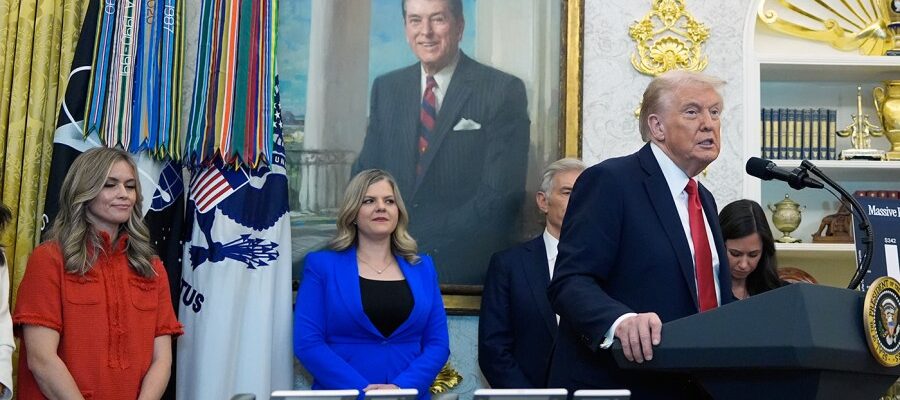Trump’s IVF move: ‘giant leap’ or ‘broken promise’?

President Trump’s two-pronged move to expand access to in vitro fertilization (IVF) is drawing mixed reactions from lawmakers, advocates and medical groups, with some calling it a step in the right direction, if only to start a conversation.
Speaking from the Oval Office on Thursday, Trump announced new federal guidelines on insurance coverage for IVF services, as well as his administration’s latest deal with a drugmaker under his “most favored nation” pricing policy.
Updated guidance from the Department of Labor, the Department of the Treasury, and the Department of Health and Human Services (HHS) will make choosing fertility benefits like choosing dental or vision benefits as part of an employer’s insurance plan.
EMD Serono, maker of commonly used infertility treatments such as Gonal-F, has announced that it will offer its “leading IVF therapy” at a steep discount. The agency said in a press release that the deal would lead to exemptions from Section 232 tariffs that the White House had threatened against pharmaceutical companies.
On the campaign trail, Trump — who called himself the “father of IVF” on Thursday — promised to make IVF available to everyone, either by the government funding it or by requiring insurers to cover it. The initiatives announced Thursday do not resemble any of these plans
Still, the announcement was well received by some groups championing fertility services.
Moshe Margareten, founder and president of Americans for IVF, called it “a huge step forward in the fight to make fertility care affordable and accessible.”
“But as meaningful as this move is, we know our work is far from over. In fact, the president said today that this is just the beginning,” Margaretten said. “We will continue to work with the White House and Congress to advocate for more reforms until every family struggling with infertility finds the support and opportunities they deserve.”
Alabama Sen. Katie Britt (R) called the announcement “the most pro-IVF thing any president has done in the history of the United States of America.”
Sean Tipton, chief advocacy and policy officer for the American Society for Reproductive Medicine, agrees with Britt’s assessment.
“But I think it indicates how low the bar is. Because these policy announcements are not going to accomplish what the president wanted to do, which is to make IVF available to everyone,” Tipton said.
He agrees that finances are a significant barrier to accessing IVF services, particularly in the United States, but he’s not entirely sold on the plea that employers consider covering fertility services for their employees.
“There are no sticks. Everything is a medium carrot,” he said.
While acknowledging that the president’s approval of IVF coverage could go a long way, Tipton said the policy is “not nearly as valuable as the law,” and it’s unclear how many agencies would actually be willing to cover the extremely expensive procedure, which costs between $15,000 and $20,000 per IVF cycle.
A reduction in the cost of Gonal-F is still significant, however, as a cycle of drug components can cost $5,000 to $6,000.
Sen. Elizabeth Warren (D-Mass.) blasted the nature of the policy, given that Congress is locked in a fight to ensure continued health care coverage.
“It is clear that Donald Trump lied when he told the American people that he would make free IVF available to every family,” Warren said shortly after the announcement.
“Instead, Trump’s new genius plan is to rip up Americans’ health insurance and explore the CDC’s IVF team, then politely ask companies to add IVF coverage out of the goodness of their own hearts — with zero federal investment and no need for them to follow through. It’s humiliating, and adds another promise to the Trump family.
Pushback from anti-abortion voices was also expected, given that unused embryos are routinely discarded or donated in the IVF process. Trump was asked about the expected criticism, which he dismissed by saying, “You can’t get more pro-life than that.”
“Any policy in this space from the White House or Congress must take the lives of the smallest children with the highest importance,” Marjorie Dannenfelser, president of the anti-abortion group Susan B. Anthony Pro-Life America, said in a statement, reiterating her organization’s position that “human fetuses should not be destroyed.”
“We support a focus on restorative fertility treatments to help couples struggling with infertility, and call for higher ethical and medical standards for the IVF industry,” he added. “Too often, the IVF industry is given blanket immunity — despite a growing number of horror stories of rogue practitioners altering embryos, ignoring basic safety standards, or carelessly destroying embryos.”
Giving embryos personhood was at the heart of the case that thrust IVF into the national conversation last year when Alabama’s Supreme Court ruled that frozen embryos can be considered the same as children. This temporarily halted IVF services in the state, with clinics fearing legal action.
Republican lawmakers found themselves in a uniquely difficult position: They agreed with the court’s findings and were flexible enough to support blocking IVF services. Democrats, in turn, cited the ruling as an outgrowth of the overturning of Roe v. Wade, blaming Trump for nominating Supreme Court justices who helped overturn the landmark ruling.
EMILY’s List, a major Democratic group that backs female Democratic candidates who support abortion access, called it “another sorry proposal” by Trump.
“While Republicans pretend to care about women, they are actively working to strip millions of women of their health insurance and push needed health care out of reach,” said Emily’s List President Jessica Mackler. “Making IVF more accessible and affordable is going to depend on securing Democratic power by taking back Congress and electing women leaders across the state who will deliver real solutions for these families.”
